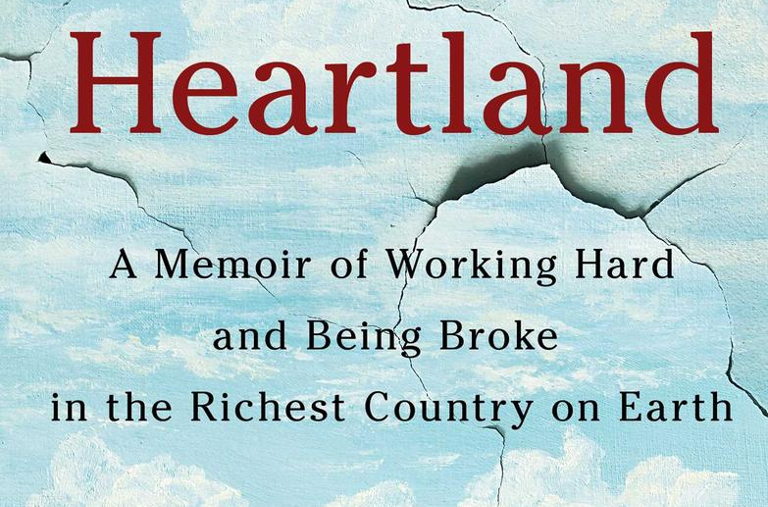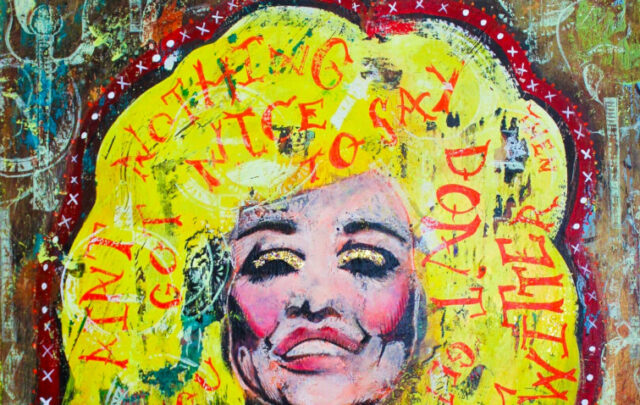Something about Sarah Smarsh’s writing makes you light up inside. You feel her joy and grief, fury and hope. I felt that way the first time I read one of her essays—“Poor Teeth,” for Aeon Magazine, several years ago. Now, reading her new memoir Heartland, the pain and fury blazed inside me again.
This is a book about what it means to be poor. It is a book about what it means to be rural. And it is a book about what it means to be a woman. All three of those things, together, could have meant a very different life for Smarsh. And that is also what this book is about: the teenage motherhood and barely-getting-by rhythms that characterized existence for her mother, grandmother, and great-grandmother. Smarsh chronicles their life stories with painstaking detail, depicting the pain and difficulty and dignity of their stories. She manages to share all of this while also making it clear why she did not want that story for herself. This book is about a legacy that has shaped Smarsh forever—but it’s also about her struggle to escape that legacy so that she doesn’t pass on the worst parts of it.
“The American Dream has a price tag on it,” she writes. “The cost changes depending on where you’re born and to whom, with what color skin and with how much money in your parents’ bank account. The poorer you are, the higher the price. You can pay an entire life in labor, it turns out, and have nothing to show for it. Less than nothing, even: debt, injury, abject need.”
Smarsh here hints at (and later on amply illustrates) something I’ve talked to many farmers about: the fact that many Americans disdain manual labor and the workers who do it. We talk dismissively about those who make our roads, buildings, and airplanes—the farmers who grow our food, the plumbers who fix our toilets, the electricians who make sure our houses have light. We pit blue-collar work against white-collar work as if the latter has greater dignity, meaning, and benefits for society. Yet if push came to shove, we could do without D.C. think tanks much more easily than the men and women who fix our roads. Sadly, all the financial benefits and security go to the knowledge economy workers, while those who make their work possible struggle from paycheck to paycheck.
“My family’s labor was undervalued to such an extent that, while we never starved or went without shelter in a chronic way, we all knew what it felt like to need something essential—food, shoes, a safe place to live, a rent payment, a trip to the doctor—and go without it for lack of money,” Smarsh explains.
Many farmers build up a narrative of dignity and pride surrounding themselves—reflected in poetry, literature, and songs about the land and those who work it. It’s the sort of narrative you need when the world discredits your worth and work at every turn. Carpenters and construction workers can take pride in a job well done—the buildings that stand as testaments to their proficiency. But in a time plagued by economic inequality and an opioid crisis (among other problems), we must ask ourselves: is this enough? Should we reconsider the ways by which we assign worth and value as a culture and a nation?
There are some important things in this book that conservatives should walk away with. First, we need to do a better job fighting poverty and empowering the poor. Those who call themselves “pro-family” should demonstrate it with policies that support single mothers and new parents (like paid family leave, for one). Sure, it would be better if businesses provided this on their own. But the fact of the matter is that many do not and will not.
Second, our language surrounding the dignity of work and self-sufficiency is good—but it is not sufficient. Smarsh writes:
Impoverished people…must do one of two things: concede personal failure and vote for the party more inclined to assist them, or vote for the other party, whose rhetoric conveys hope that the labor of their lives is what will compensate them. It’s a hell of a choice, and initially I made mine based on my mother’s ideas. …[But] study after study that I found in my research for the class plainly said in hard numbers that, if you are poor, you are likely to stay poor, no matter how hard you work. As I examined the graphs over and over, my heart sped up with shock and anger. On the matter of my own country’s economic system, for all my family wisdom about what something ought to cost and who was peddling a con, I had been sold a bill of goods.
But Smarsh also makes clear that liberal policy hasn’t often been much better. Conservatives eschew the vices of big government and insist we should give the poor “a hand up, not a handout.” But big business and big government are both vicious beasts, and both have failed the impoverished at every turn—often by working together in order to enrich themselves. Those who work hard at jobs their entire lives are not able to “pull themselves up by the bootstraps,” despite Republican assurances. Yet the indignity associated with taking welfare is still unsavory to those who find themselves bound to it, as Smarsh explains:
[T]he liberal people I met in college often were missing another sort of information: What it feels like to pee in a cup to qualify for public benefits to feed your children. A teenager’s frustration when a dilapidated textbook is missing a page and there’s no computer in the house for finding the lesson online. The impossibility of paying a citation for expired auto insurance, itself impossible to pay despite fifty hours a week holding metal frying baskets at KFC.
It wasn’t that I’d been wrong to be suspicious of government programs, I realized, but that I’d been wrong to believe in the American Dream. They were two sides of the same trick coin—one promising a good life in exchange for your labor and the other keeping you just alive enough to go on laboring.
It’s a stinging critique of our broken system. Smarsh writes with the white-hot fury of moral indignation, rightly pointing out injustices that our society has propagated for far too long. But she also writes with a poignancy and compassion that drove me to tears more times than I can count. Smarsh eventually chose progressivism. She saw a greater acknowledgment of her people amongst progressives who campaign for universal health care and champion “women’s rights” than among Republicans who want more work requirements on food stamp recipients and who voted for a man who boasted about sexually assaulting women. Honestly, I do not blame her.
But Smarsh’s book is not just, or even primarily, about family. It also reminds us that legacy and community—as well as family—all matter. Her family imbued in her a grit, resilience, and determination that have served her well—even if their legacy also involved an emotional hurt and financial want that she had to struggle against.
One thought I had while reading Smarsh’s book is that placelessness features largely in the instability and resulting poverty of her story. She does an excellent job explaining why instability is so common among the poor—especially poor women. But I’ve also observed the way embeddedness in good communities (ones with lots of involved citizens, nurturing neighbors, and vibrant associations) has historically fostered better opportunities and social capital for those who stick around, even the poor. Unfortunately, these sorts of communities are on the decline throughout America—which means you have to get lucky in order to find a place like that, or to be born into it. I have increasingly realized that I was one of the lucky ones. There’s a privilege that comes not just from a family or an income, but from a place that nurtures and grows you. Fewer and fewer Americans live in those sorts of places.
It’s been a long time since I lost myself in a book. As a kid, it happened far more often, burying myself in my room for entire afternoons, unable to emerge until I had finished every page. That is how I felt reading Smarsh’s book: as if the world could wait until I got to the end. Smarsh’s book belongs with Ta-Nehisi Coates’ Between the World and Me and J.D. Vance’s Hillbilly Elegy as a volume with a transformative vision—a message for a blind and uncaring America, which needs to wake up. Hopefully we will not just open our eyes. Hopefully we will also change.





